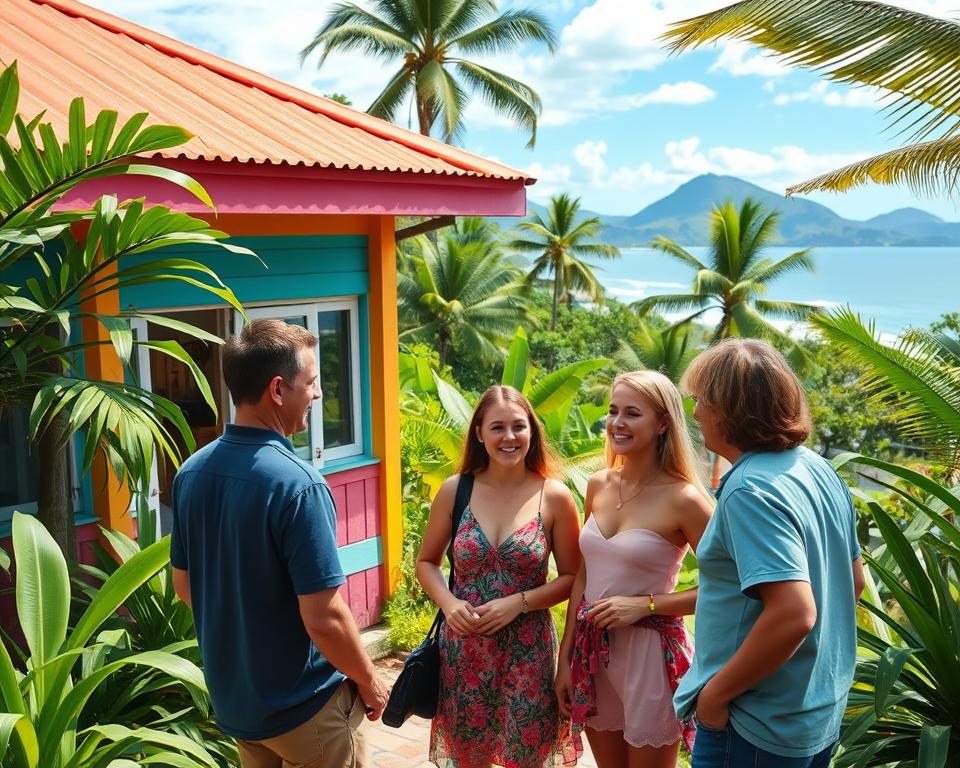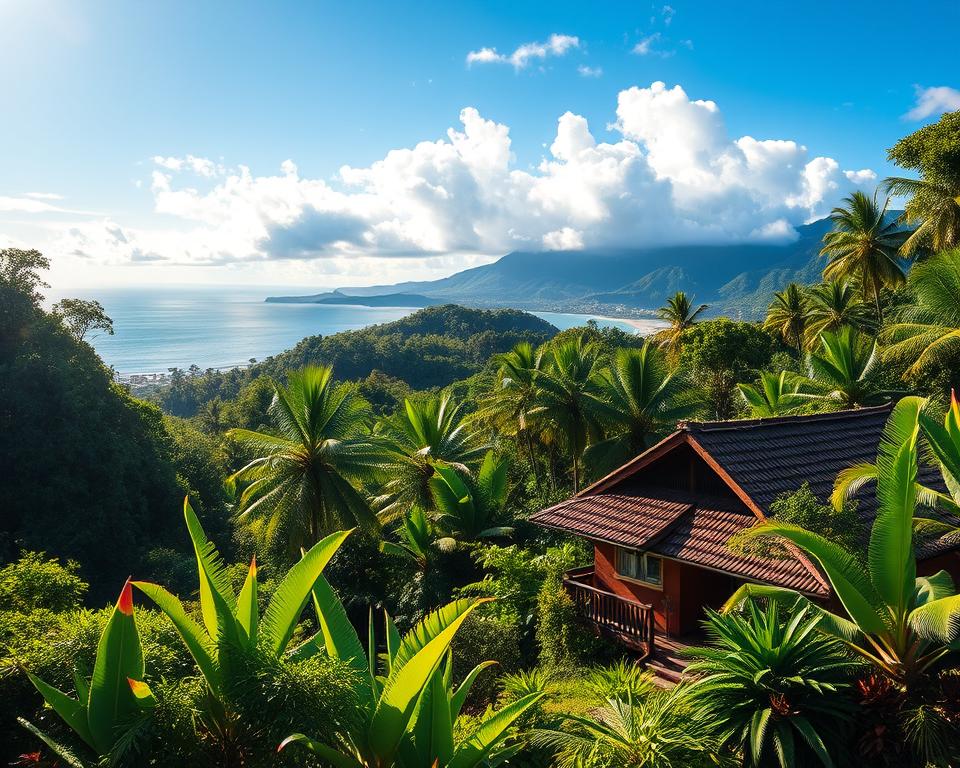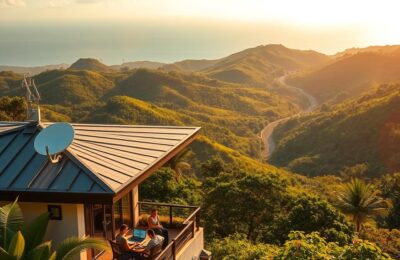Living in Costa Rica: Key Pros and Cons Revealed
Is the dream of living in Costa Rica just a tropical fantasy, or could it turn into a bittersweet reality?
Thinking about moving to Costa Rica? The idea of stunning beaches, rich biodiversity, and vibrant culture is tempting. But, the expat experience in Costa Rica is complex. It’s filled with breathtaking sunrises and potential challenges. This article is a key Costa Rica relocation guide, covering both the good and the bad. It helps you understand the cost of living and safety concerns in popular areas.
Every part of living in Costa Rica as an expat will be looked at closely. This will give you the knowledge you need to move smoothly.
Key Takeaways
- The cost of living in Costa Rica has risen significantly over the past decade.
- Monthly rent for a one-bedroom apartment can range from $500 to over $2000 depending on location.
- Safety concerns such as rising crime rates are crucial to consider when relocating.
- Healthcare in Costa Rica offers affordable options averaging $100 to $200 USD monthly.
- Understanding residency requirements is essential for a smooth transition.
Introduction to Living in Costa Rica
Costa Rica is a magnet for people from all over the world. It’s famous for its incredible biodiversity, with over 5% of the world’s species. The climate is mostly tropical, with temperatures between 70°F and 81°F. This makes it perfect for those who love spending time outdoors.
The Costa Rica lifestyle is a big reason why people move here. The country values peace and sustainability, having no military since 1948. Its culture is warm and welcoming, helping newcomers feel part of the community.
Healthcare in Costa Rica is also a big plus. Both public and private options are available. Public system monthly premiums are low, and doctor visits cost between $50 and $120. This makes it easier for those looking at moving to Costa Rica advice.
But, there are things to consider when moving here. Real estate prices are going up, and renting can be expensive. For example, one-bedroom apartments in cities can cost over $800. Still, the cost of living is lower than in the U.S. and Western countries.
In short, Costa Rica offers a relaxed lifestyle in stunning nature. It also has affordable healthcare and a vibrant community. Prospective residents need to understand the environment and culture to fully enjoy this beautiful place.
Pros and Cons of Living in Costa Rica
Thinking about moving to Costa Rica? It’s good to know the good and the bad. Costa Rica is known for its natural beauty and a great lifestyle. But, there are also some challenges to consider.
Overview of Benefits
Costa Rica is a paradise for nature lovers. It has rainforests, beaches, and volcanoes. The healthcare is affordable and well-regarded.
The economy is strong, and there’s no military. This makes it a stable place to live.
- Rich biodiversity, with roughly 27% of the land designated as national parks.
- A welcoming culture that fosters strong personal relationships and community support.
- Affordable cost of living relative to North America, particular outside major tourist areas.
- A laid-back lifestyle embodied in the local saying “pura vida.”
Common Drawbacks
Costa Rica has its downsides too. The cost of living is going up, mainly in cities like San José. Expats face challenges with the local infrastructure, like getting around and dealing with utilities.
Crime rates are high, and the postal system can be a hassle. These issues make everyday life tough for newcomers.
- Adaptation to cultural differences and the local pace of life may be challenging.
- Language barriers present difficulties as Spanish is dominant, and not all locals speak English.
- Expensive imported goods and cars due to high tariffs impact overall living expenses.
- Receiving packages can be problematic due to inefficiencies in the postal system.
Costa Rica Lifestyle: A Detailed Look
The Costa Rica lifestyle is a mix of rich culture, community spirit, and outdoor fun. It makes living there a special experience. People here value family, warmth, and the “Pura Vida” way of life, which means living fully.
Expat life in Costa Rica is all about these cultural values. They help build strong friendships and a sense of home.
Culture and Community
Community events and family gatherings are key in Costa Rica. Family is at the heart of daily life, with gatherings providing support. National holidays, like Independence Day, bring joy and pride with parades and fireworks.
Weekly markets, or “la feria,” are places where locals sell their crafts and produce. They help strengthen community bonds and support local businesses.
Daily Life and Activities
Daily life in Costa Rica is all about enjoying the outdoors and taking it easy. People wake up early to enjoy the sunshine. The country offers many outdoor activities like ziplining, surfing, and sunset cruises.
For fitness enthusiasts, yoga classes and gym memberships are affordable. The public transportation system is also cheap, making it easy to get around. This adds to the many benefits of living in Costa Rica.
Costa Rica Living Costs: What to Expect
Thinking about moving to Costa Rica? It’s important to know the living costs. The cost of living varies based on lifestyle, location, and personal choices. Here’s what you need to know about housing and monthly expenses.
Housing and Rentals
Rental prices in Costa Rica change based on where you are. For example, in Jacó, you might pay $400 for a small two-bedroom or over $2,500 for a luxury condo. In San José, a one-bedroom apartment costs between $600 and $1,600. In rural areas, you can find rentals for $300 to $600.
Utilities and Other Monthly Expenses
Utilities for an apartment cost between $50 and $150. For a couple, monthly expenses average around $2,110. This includes housing, food, and entertainment. Rent is about $800, electricity is $50, and groceries are roughly $400.
Eating out is affordable, with a meal at a soda costing about $4.50. Other expenses like cable, internet, and transportation also add up. Remember to include these in your budget.
Comparison with Other Countries
Costa Rica’s living costs are similar to or higher than some parts of North America. A single person can live comfortably on $1,600 to $2,000 a month. Some retirees even thrive on $2,000 to $3,000 a month. This covers housing, medical care, and leisure activities, making Costa Rica a great choice for expats.

Healthcare System in Costa Rica: A Boon for Expats
The healthcare system in Costa Rica is highly regarded, attracting many expatriates. It offers quality care at affordable prices. The country has a comprehensive public healthcare system managed by the Caja Costarricense de Seguro Social (CCSS). This includes 30 public hospitals and over 250 clinics.
For those thinking of moving, it’s important to know the difference between public and private healthcare. This knowledge helps in making the right choice.
Public vs. Private Healthcare
The CCSS provides affordable and high-quality care to both citizens and legal residents, including expats. Funding comes from about 7% to 11% of monthly income. Monthly fees for expats range from $100 to $230 USD.
Many find public healthcare services comprehensive. Yet, some expatriates prefer private healthcare for quicker service and more personalized care.
- Public healthcare provides extensive coverage across the country.
- Private healthcare includes various options, from clinics to specialized hospitals.
- Combining both systems is common, allowing for better access to services.
Cost of Medical Services
Healthcare in Costa Rica is much more affordable than in the United States. A typical doctor’s visit costs between $60 to $75. Specialist appointments can cost around $100.
For more extensive procedures, the savings are even greater. For example, a knee replacement costs about $12,000 in Costa Rica, compared to around $50,000 in the U.S. Dental services like implants are also priced lower, costing between $1,000 to $1,500 per tooth.
Private healthcare plans from the Instituto de Seguro Nacional (INS) vary, with monthly premiums from $60 to $250. These plans cover roughly 80% of medical expenses. For international options, providers like Allianz, Cigna, and Blue Cross Blue Shield offer plans starting at $100 and can reach up to $1,000 monthly.
Climate and Environment: Advantages and Challenges
The climate in Costa Rica is a big reason why people love it. It has different weather patterns in each area. Temperatures usually range from 70°F to 90°F, making it warm and tropical.
But, there are things to think about like the rainy season and natural disasters. These are important to consider if you’re thinking about moving there.
Weather Patterns
Knowing about the seasons can help you decide where to live. Costa Rica has two main seasons: dry and rainy. The dry season is from December to April, and the rainy season is from May to November.
During the rainy season, it can get really wet. This can affect your daily life and what you can do outside.
- Dry season has lots of sunshine and nice temperatures.
- Rainy season is wetter and can cause flooding in some places.
- Even close together, the weather can be very different.
Natural Disasters and Environmental Considerations
Costa Rica is beautiful, but it’s also important to know about environmental challenges. Things like earthquakes and hurricanes can be a risk. It’s important to think about these when choosing where to live.
- Earthquakes can happen, mostly near tectonic plate boundaries.
- The Caribbean coast is at risk for hurricanes.
- Heavy rain can cause flooding, affecting buildings and daily life.

When choosing a place to live, think about the climate and safety. Talking to locals and staying up to date with environmental news can help. With the right planning, many people find Costa Rica a great place to live, despite its challenges.
Safety and Security in Costa Rica
Living in Costa Rica as an expat raises important safety and security questions. The country is ranked 39th on the Global Peace Index for 2023. It’s considered one of the safer places in Latin America. Yet, crime does happen, mainly in certain areas. This section looks at crime rates in Costa Rica and offers tips for staying safe.
Crime Rates and Safety Concerns
Costa Rica faces crime challenges, with a murder rate about double that of the United States. Places like Los Guido have higher crime rates. Tourist spots like Playa Flamingo and Tamarindo see petty theft, like purse snatching and pickpocketing. With around 12.3 homicides per 100,000 residents in some areas, staying alert is crucial.
Despite these issues, Costa Rica is the 8th safest country in Latin America, according to the Gallup Law and Order Index. It’s important for residents to know about local safety and use community resources to stay safe.
Tips for Staying Safe
To stay safe in Costa Rica as an expat, follow these tips:
- Stay informed about current local issues and crime trends.
- Avoid high-risk neighborhoods, mainly at night.
- Secure your home with good locks and security.
- Keep personal items close and hidden in crowded places.
- Get to know your neighbors and join community activities to build trust and support.
By being cautious and getting to know the local area, you can have a great time in Costa Rica while keeping yourself safe.
Residency and Legal Requirements for Expats
Expats need to know the Costa Rica residency rules to live there. There are many residency options, each for different needs and budgets. The main ones are Pensionado, Rentista, and Investor visas, each with its own rules and perks. This part explains these options and what laws residents must follow.
Types of Residency Visas
Expats in Costa Rica have several residency options:
- Pensionado Visa: For retirees, it needs a monthly pension of at least USD $1,000.
- Rentista Visa: For those with a steady income of USD $2,500 monthly for two years.
- Investor Visa: With a lower investment need of USD $150,000, thanks to Law No. 9996. It lets investors get residency through their investments.
Each visa has its own benefits, like tax breaks. For example, investors get tax-free on some items and income. This makes it a good choice.
Legal Obligations for Residents
After getting residency, expats must follow Costa Rica’s laws. These include:
- Joining the public healthcare system, the Caja Costarricense de Seguro Social (CCSS), with taxes from 7% to 11% of income.
- Knowing the tax system, with rates from 1% to 25% for residents, and fixed rates for non-residents.
- Following work permit rules if they want to work locally.
The residency process takes time, but you can stay in Costa Rica while waiting. It’s key for expats to know these rules for a smooth move. For more on living options, like gated communities, check gated retirement communities in Costa Rica.
Conclusion
Living in Costa Rica offers both great opportunities and challenges for expats. The cost of living is affordable, with one-bedroom apartments costing between $400 and $1,500 a month. Healthcare is also a big draw, making Costa Rica a popular choice for moving.
The living in Costa Rica guide highlights these benefits. It shows a lifestyle full of vibrant culture and community.
But, there are also challenges like the language barrier and sometimes uneven infrastructure, mainly in rural areas. For those thinking about moving to Costa Rica, it’s important to weigh these pros and cons. Being well-prepared and having realistic expectations can make the transition smoother.
Prospective movers should explore local resources and connect with other expats. This can help them adjust better and enjoy their life in Costa Rica.




